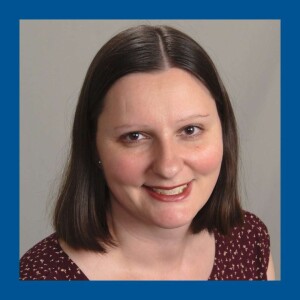Episodes

Thursday Oct 24, 2019
Thursday Oct 24, 2019
Les cheminements que vous suivrez après vos études graduées peuvent prendre des tournants très variés. Il se peut que vous suiviez un parcours purement académique, une carrière en industrie ou que vous vous lanciez en entrepreneuriat. Quel que soit votre choix ou la passion qui vous motive, les habiletés et l’endurance que vous aurez acquises tout au long de votre maîtrise ou de votre doctorat seront de précieux atouts qui vous serviront au quotidien. Aujourd’hui, Virginie Levasseur partagera avec vous son trajet ainsi que les stratégies et les initiatives qui l’ont aidée à tirer le meilleur parti de son temps à l’université et à trouver sa place dans le domaine du développement international.
Virginie Levasseur, Ph.D. en Agronomie Tropicale, évolue dans le domaine de la recherche et du développement international depuis 20 ans. Ses activités professionnelles, menées principalement en Afrique de l’Ouest, en Amérique latine et en Haïti, lui ont permis de développer une connaissance approfondie des systèmes de production agricole et agroforestière, des logiques paysannes qui sous-tendent le maintien de ces systèmes, la répartition des tâches, des responsabilités et des revenus entre les femmes et les hommes, ainsi que des organisations de productrices et de producteurs qui appuient leur développement. Parmi ses réalisations, on compte la mise sur pied d’un centre de recherche et de développement pour les cultures maraîchères en Afrique de l’Ouest. Au cœur de ses actions, le souci d’agir sur l’ensemble de la filière : promotion de technologies agricoles durables, vulgarisation de paquets techniques pouvant renforcer la résilience des écosystèmes et des moyens d’existence ruraux face aux impacts des changements climatiques, amélioration de la productivité et des revenus des productrices et des producteurs, soutien aux organisations paysannes pour l’accès aux intrants, la transformation et la commercialisation des produits maraîchers. Elle est présentement directrice du programme Afrique chez Socodevi, où elle travaille depuis 9 ans.
Joignez-vous au groupe d'exploration de carrières Papa PhD !
Ce que vous apprendrez dans cet épisode :
L’importance de participer aux associations étudianteLes différentes retombées du fait de s’impliquer dans les conseils d’administration de votre universitéQuand commencer à envoyer des CV et comment s'y prendreLe profil d'un chercheur en développement internationalL'intérêt d'un doctorat en co-tutelle entre deux universités pour faire un doctorat « sur mesure » pour vousLes perles de sagesse de Virginie :« On est ce qu’on est et il faut s’accepter, à un moment donné. Et c’est pour ça, aussi, qu’on prend des chemins différents. »« Wow! Tu as un PhD, tu dois être intelligente… Je ne suis pas intelligente, je suis déterminée – il y a une grosse différence! »« On essayait de me dire tout au long de mon entrevue que je n'avais pas les connaissances de ci, je n'avais pas les connaissances de ça, et je n'arrêtais pas de dire "oui, mais j'ai un doctorat – je suis capable d'apprendre vite sur n'importe quel sujet, c'est ça ma caractéristique de base, je peux approfondir n'importe quel sujet, je peux lire n'importe quoi. Je ne vais pas devenir une spécialiste dans tout, mais je vais devenir une très bonne généraliste – faites-moi confiance là-dessus. »Les liens de Virginie: LinkedIn: LinkedIn.com/in/Virginie-Levasseur-3b9b1946; Socodevi.org; Facebook: Facebook.com/Socodevi; Twitter: @Socodevi; Effet A: Effet-A.com
Laissez une évaluation sur Podchaser !
Soutenez Papa PhD sur Patreon !
Vous aimerez aussi ces épisodes :
David (Viva Frei) Freiheit – Youtube content creator: PapaPhD.com/15Tamarah Luk – Entertainment Law: PapaPhD.com/10Kirsten Sanford – Science communication: PapaPhD.com/13Inês Thomas Almeida – Musicology: PapaPhD.com/27

Thursday Oct 17, 2019
Thursday Oct 17, 2019
Your dream job is out there somewhere. The one you were made for, the one you deserve. It may be one handshake away, one conversation away, one introduction away. So, make sure you give yourself the chance to attend events, to go to seminars in domains that interest you but are outside of your area of research. This will give you the opportunity to learn about career spaces adjacent to yours and to incrementally move towards that conversation and that position that will bring you meaning and fulfilment. In this episode, we’ll be hearing from Sathy Rajasekharan about the different stages that brought him from the bench to the global health arena.
Sathy Rajasekharan is Chief Innovation Officer at Jacaranda Health, and overseas development of innovative tools, research projects, and public sector and academic partnerships, with the aim of leveraging Jacarandas expertise and insight to influence maternal healthcare in East Africa. Prior to joining Jacaranda Health, Sathy was a Senior Program Manager for the Drug Access and Health Financing teams of the Clinton Health Access Initiative (CHAI), and led CHAIs work providing technical assistance to the Swaziland Ministry of Health. He has held previous positions as the Associate Director of the McGill University Centre for Biomedical Innovation (MCBI), where he helped develop a commercialization plan for health technologies. He was also the Associate Director of a translational research program at the Montreal Neurological Institute. Sathy holds a PhD in Neurology and Neurosurgery.
Join the Papa PhD Postgraduate Career Exploration Group!
What you’ll learn about in this episode:
The importance of setting up your expectations and your objectives for your graduate research
How learning new skills can open your career horizons and home in on your deep values and interests
How a job or an internship in a small team or in a small company can be an opportunity to rapidly level up by taking on challenging responsibilities
How to look for alternative academic careers, if you want to work in close connection with university and with research, but do not want to work in research yourself
Why you should attend events and network around your department/institute/university
The importance of preparing your interview with each potential employer and of practicing it, to the point where your pitch comes out naturally and you can focus on the points the employer is looking for in particular
This episode's pearls of wisdom:
“I think it’s just great to be a student of as much as possible. Even if your career path is academia, exposing yourself to a broad range of thoughts and thinking, and skills is so important. It’s so enriching for a human to do that.”
“I think that is a fundamental skill that most people sell short in graduate school – the ability to process information very quickly and apply it.”
“The more you talk, the more you pitch, right? So you learn how to refine the story about yourself. The question everyone is going to ask is “so why do you want to do this?” and why they should hire you. And you just come up with your unique selling proposition as much as possible as a candidate.”
“No one ever asks you in an interview how many hours a day you work, right? They don’t care. What they really want to know is ‘what have you done?’ And maybe that’s your scientific output, but maybe it’s your hobby or your side-gig. So if you can do it, try and do it, try and find that balance where you’re able to learn different things and do different things.”
Sathy's links: LinkedIn: LinkedIn.com/in/SathyRajan; Website: JacarandaHealth.org
Leave a review on Podchaser !
Support the show on Patreon !
You might also like the following episodes:
David (Viva Frei) Freiheit – Youtube content creator: PapaPhD.com/15
Tamarah Luk – Entertainment Law: PapaPhD.com/10
Kirsten Sanford – Science communication: PapaPhD.com/13
Inês Thomas Almeida – Musicology: PapaPhD.com/27

Thursday Oct 10, 2019
Thursday Oct 10, 2019
Life is not in black and white. Your life, who you are, is a patchwork stemming from your upbringing, your experiences, who you've met, the choices you've made. What you studied is also a piece of this patchwork, but it's not the whole thing. And the more you go into your adult life, the more you end up painting that mosaic to your iage and to your tastes. In this week's interview, you'll be hearing from David Freiheit about getting a law degree and becoming a litigator, and about how he has been able to marry his knowledge of law to his love of photography and film.
David (Viva Frei) Freiheit began his career in law in 2005 at one of Canada's largest law firms. After the birth of his first daughter, he left the big-firm life to start his own practice, which he built into a boutique litigation firm of 4-5 lawyers and over 250 clients. He ultimately expanded his professional and creative horizons by delving into YouTube videography. 26 million views later, with over 51 million watch minutes, it's become something bigger than a pastime, and has led to him vlogging almost daily.
Join the Papa PhD Postgraduate Career Exploration Group!
What you’ll learn about in this episode:
Tips to help you integrate and make the most of your studies as an out-of town student
How participating in student life can enrich your time at university and how it is perceived by employers later on
The importance of establishing a rapport with your professors throughout your studies
Key skills you can expect to develop in law school
This episode’s pearls of wisdom:
“What skills were very important for you that you learned in law school that then served you a lot in your work as a lawyer? It's the one skill, and I don't think it's unique to law – and it's not so much a skill, it is a question of appreciating what you don't know and and being aware of what you don't know before thinking you know something.”
"Life moves quickly. Don't stick to something for ten years if you know you hate it after five."
"As far as study goes, be diligent, make friends with the students, and make friends with the professors. Not friends like in 'buddy-buddy'... just let the professors know that you're interested in what you're studying, what's going on, because when a professor knows that you're serious, and that you exist, and that you're responsible, and that you'te taking thing seriously, on the one hand, it's good to know the professors personally, but, on the other hand, if it comes to asking for a revision of an exam, and the professor knows that you've been working hard all semester, versus they've never seen you except when it comes time to complain about the exam, it changes things a little bit."
"Get out there, meet people, get to know the city – just don't get stuck in the habit of going to school, going home and not meeting people and not getting out there... Sun and exercise, also!"
David's links: Youtube: Youtube.com/VivaFrei; Facebook: Facebook.com/VivaFrei; Twitter: Twitter.com/theVivaFrei
Leave a review on Podchaser !
Support the show on Patreon !
You might also like the following episodes:
David (Viva Frei) Freiheit – Youtube content creator: PapaPhD.com/15
Tamarah Luk – Entertainment Law: PapaPhD.com/10
Kirsten Sanford – Science communication: PapaPhD.com/13
Inês Thomas Almeida – Musicology: PapaPhD.com/27
Launching your podcast?
If you're preparing to launch your podcast, you may be asking yourself what hosting platform to use.
I launched Papa PhD on Bluebrry because I wanted a professional service that would interface with my WordPress website, that would robustly broadcast Papa PhD to all platforms, and that would allow me to grow my podcast in years to come.
And these are the reasons why I'm recommending the Blubrry podcast hosting and syndication platform.
Click on the button below or use the promo code PapaPhDBlue on the Blubrry website to unlock a one month free trial:

Thursday Oct 03, 2019
Thursday Oct 03, 2019
Pourquoi faire une maîtrise ? Pourquoi faire un doctorat ? Tout ça peut paraître bien compliqué et bien difficile quand on termine notre baccalauréat. Une conversation avec un professeur sur un sujet qui vous intéresse peut changer votre perspective et vous projeter dans une aventure où votre détermination et votre persévérance seront mis à l’épreuve et d’où vous sortirez armés d’un ensemble d’habiletés bien particulières. Dans cet épisode, Simon Landry partage avec nous son expérience et son trajet au doctorat et les leçons qu’il en a retiré pour sa vie professionnelle.
Simon Landry est un Acadien. Il a fait son doctorat à l'Université de Montréal en audiologie. Simon a lancé une application, travaillé pour une compagnie de réalité virtuelle, fait des vidéos YouTube neuroscientifiques et un balado. Il travaille maintenant en transfert des connaissances à Toronto et essaie de créer une compagnie en ligne (aventure qui est partagée sur son balado qui s’apelle Fait comme ça).
Joignez-vous au groupe d'exploration de carrières Papa PhD !
Ce que vous apprendrez dans cet épisode :
Le syndrome de l’imposteur et comment y faire face quand on démarre nos études graduées
L’importance de se raconter son sujet de recherche et de savoir le raconter à un public non scientifique
Quel impact a-t-on comme chercheur sur la société, dans la vraie vie, et quel impact cela peut avoir dans notre satisfaction par rapport à notre sujet d’étude
Le rôle qu’un blogue, un portfolio en ligne peuvent jouer dans la promotion de vos habiletés et de vos connaissances et dans votre recherche d’emploi à venir
Le questionnement identitaire qui peut survenir quand on quitte le milieu académique
Les pépites d'or de l'épisode :
« J’ai toujours vu mon doctorat comme un projet que mon superviseur m’a dit ‘vas-y, c'est à toi, je m’attend à quelque chose dans 5 ans.' Donc je sais que je suis capable de créer des connaissances – ce qui est quand-même incroyable, quand tu y penses. Je suis capable de créer quelque chose de rien et prendre 5 ans pour le faire – je suis capable d’entreprendre des projets de très, très grande envergure. »
« Je suis capable de voir les liens entre les différents systèmes parce que je sais que je peux aller très pointu dans quelque chose, mais que si je regarde d’une autre perspective, eh bien, cette affaire-là a mille autres liens qui interagissent avec mon sujet de mille différentes manières. »
« L’intelligence, c’est juste la persévérance. Ce qu’on considère comme de l’intelligence, c’est juste être capable de persévérer et de lire des articles, et juste continuer et de ne pas arrêter quand on frappe un mur. »
Les liens de Simon : Twitter – @DrSimonLandry ; LinkedIn – www.linkedin.com/in/simonlandry
Laissez une évaluation sur Podchaser !
Soutenez Papa PhD sur Patreon !
Vous aimerez aussi ces épisodes :
David (Viva Frei) Freiheit – Youtube content creator: PapaPhD.com/15
Tamarah Luk – Entertainment Law: PapaPhD.com/10
Kirsten Sanford – Science communication: PapaPhD.com/13
Inês Thomas Almeida – Musicology: PapaPhD.com/27
Envie de lancer un podcast?
Mon ami et collègue podcasteur Marco Bernard et son Académie du Podcast ont ce qu'il vous faut si vous avez une idée, mais qu'il vous manque les connaissances pour mettre en place votre podcast.
Dans la formation Podcasting 101, Marco a préparé plus de 20 vidéos et des tutoriels où il explique quel équipement se procurer, comment faire le montage et comment le mettre en ondes sur les principales plateformes. Cliquez maintenant pour vous inscrire et avoir accès à la communauté !
Formation Podcasting 101 de l'Académie du Podcast
Dans la formation Podcaster Pro, il a pensé aux professionnels et créateurs qui non seulement veulent lancer leur podcast, mais ont des objectifs précis à atteindre avec celui-ci. C'est en pensant à eux qu'il a préparé plus de 80 vidéos et des tutoriels où il explique non seulement comment lancer son podcast,

Monday Sep 30, 2019
Monday Sep 30, 2019
Download "Tools for Your PhD Journey" Now !
If you decide to embark on the graduate studies journey, you may find yourself telling stories. Stories about ideas, stories about science, stories about stories. You will focus and research until late hours of the night to find that piece of information, to fill that gap in the narrative. You will crumple a whole chapter that isn’t working and restart from scratch. And one day, you’ll have in your hand the final version, and you will share it with the world, placing one more tile in the ever-growing mural that is scientific knowledge. This week, we’ll be hearing from Kirsten Sanford, whose central passion in life is to take this constantly evolving patchwork of questions, results and publications and make it understandable to an audience as vast as possible.
Kirsten (Dr. Kiki) Sanford is a science communicator with over 15 years of experience in media, science journalism, and informal science education. She received a BS degree in Wildlife, Fisheries, and Conservation Biology, and a PhD in Neurophysiology from UC Davis before transitioning into a career focused on translating scientific research to various audiences and helping scientists in their communications efforts. In 2015, Dr. Kiki founded Broader Impacts Productions, a boutique production agency dedicated to science storytelling. Additionally, she founded, produces, and hosts the This Week in Science (TWIS) podcast, a weekly live show that covers a multitude of science topics in a talk-show format, and is also the VP of Public Relations for Science Talk, a non-profit science communication organization.
Join the Papa PhD Postgraduate Career Exploration Group!
What you’ll learn about in this episode:
The value of investing time on your broader interests while staying focused on your research subject
How internships can jump-start your career transition through networking and opportunities, but also as a platform to learn new, specialized skills organically
The importance of observing, listening, and asking questions when you have the chance, when surrounded by people who work in your domain of interest
How your graduate research project management and learning skills translate into your post-MSc or Post-PhD career
How starting a student club or group can set you up for your professional future
This episode's pearls of wisdom:
“I was able to pick things up and still try to pick new things up even though technology keeps moving forward – “Oh, I have to learn this new skill, I have to do this new thing…” – that is grad school! Every time you want to add a new technique to your studies to be able to ask a certain question, you learn something new. This mindset, you learn as a student – that you can always learn something.”
“Impostor syndrome is something that we are hearing about a lot these days. Just know that if you are in graduate school, you have gotten there for a very good reason, and you are a capable, intelligent human being.”
“Find other people that you can connect with. I think that number 1 – humans are social beings, and if we keep all these things to ourselves, it’s damaging, in the end, and we need to be able to connect with other people about these thoughts of this thing we’re attempting, you know? Graduate school is a long and arduous adventure and you’re not always going to feel like you’re winning. It’s not always winning – there’s a lot of losing, there’s a lot of failure, and it makes you feel really bad, and it makes you doubt yourself. So find other people. If you don’t have a great relationship with your PI, find other grad students, find other advisors – you need to search for those people. Sometimes they come to you, but you need to be willing to open your eyes and see them as a possible connection.”
“Pay attention to opportunities, pay attention to the world around you so you see the opportunities and are able to act on them if it’s something that you want.”

Thursday Sep 26, 2019
Thursday Sep 26, 2019
Leaving the bench doesn’t necessarily mean leaving science and the scientific community altogether. A rich universe of activities exists that are closely related to academia, be it within universities or in external organizations or governing bodies. Having gone through grad school and lived research from within, you are well placed to fulfill roles that bridge these two universes, be it in administration, knowledge transfer, or the policy domain. This week, we’ll hear about how Adriana Bankston navigated her transition from a PhD in biochemistry, cell and developmental biology into a policy job in DC.
Adriana Bankston is a Principal Legislative Analyst at the University of California Office of Federal Governmental Relations in Washington, DC. Prior to this position, she was a Policy & Advocacy Fellow at The Society for Neuroscience (SfN), where she provided staff support for special and on-going projects, including SfNs annual lobby event and the society’s annual meeting. In addition to working at UC, Adriana also serves as the Director of Communications and Outreach for the Journal of Science Policy and Governance (JSPG) and is an Associate Member of the Public Policy Committee with the American Society for Cell Biology (ASCB). For the past several years, Adriana has also been an active member in the non-profit organization Future of Research (FoR), where she is currently the Vice-President and has previously served as the Associate Director of Fundraising and Strategic Initiatives. Adriana received her B.S. in Biological Sciences from Clemson University and her Ph.D. in Biochemistry, Cell and Developmental Biology from Emory University.
Join the Papa PhD Postgraduate Career Exploration Group!
What you’ll learn about in this episode:
How creating a club or a seminar series can inform your career research and jumpstart your networking towards transitioning into it
Why you should get involved in the activities of national organizations in your domains of interest, or even volunteer in them
The importance of making choices that fit your personality, be it in grad school or in your professional life
How setting up informational interviews allows you to garner precious information about your domain of interest
Why you should practice talking about your science. Hone your storytelling skills around your subject and your research to be able to have engaging conversations about what you do
Project management as a skill you grow during grad school that will serve you in your professional life and that will be valued by employers out there
The importance of having a research background when working in policy
Where you can find different types of mentorship during your grad studies
The importance of women in STEM as role models and mentors for young researchers
This episode’s pearls of Wisdom:
“When you’re in academia, everyone is a PhD, and everyone is like you, but when you’re here, it’s not, because most people in the office have totally different backgrounds, which is really interesting – you get to work with people who are from different worlds and all work together in this space. And having that research background is useful.”
“Take advantage of university resources that exist or create them, if you can. Get involved with things that you’re interested in nationally, if there is an organization, which there probably is. Or talk to people who have jobs that you want to do.”
“I think you have to just have that mindset that your career is as important as your bench work, and that’s something you have to cultivate over time. It’s going to take a while to build your CV for whatever you want to do, if it’s not academic, so start early during your PhD.”
“A lot of jobs work through networking, so if you can get your name out there and people know that you are interested, and you’ve started building your CV, then once you apply for the job, you’re a little more ahead than other people.

Thursday Sep 19, 2019
Thursday Sep 19, 2019
It's never too late to follow your calling. Depending on where you are in life, there are many ways you can reorient and choose a new path for yourself, be it getting a second degree, growing your minor or a hobby into your main focus or getting a certification in your domain of interest. This week, we'll hear about how our guest went from a bachelor's in theater to a PhD in neuroscience, and eventually to a fulfilling career as a startup CEO.
Chris Kent has served as the CEO of ODS Medical since its’ founding in 2015. ODS Medical is a medical device company commercializing an exclusive Raman spectroscopy system for real-time, intra-operative tumor margin detection during surgical oncology procedures. Prior to ODS Medical, he worked with Dr. Kevin Petrecca, building a translational research program at the Montreal Neurological Institute focused on working with industry partners to accelerate the discovery and pre-clinical development of a wide variety of small molecules and biologics for treatment of brain cancers. Prior to his work at the MNI, Chris was involved with a start-up that specialized in the application of stimuli-responsive polymer materials to a wide range of industries.
Join the Papa PhD Postgraduate Career Exploration Group!
What you’ll learn about in this episode:
How meeting and talking with people of your domain of interest is central to gathering data during your job search
Starting a club or an activity to bring together likeminded people with whom do discuss and exchange about common interest subjects outside your research
The importance of making grad school or a PhD a conscious choice, rather than just the next logical step in your studies
How fear of the unknown is part of career growth, and a sign that you are on the right path in terms of tracing a fulfilling and productive career path for yourself
Transferable skills that are prized in the entrepreneurial/startup domain
The importance of being able to tell your story and to get people excited about it in your post-MSc/post-PhD professional life
Finding mentors outside academia through your academic network
What key skills serve you best as the CEO of a startup
This episode's pearls of wisdom:
“The great thing about being a grad student is that although you’ve got way more work than time, you can set your own schedule. So, you can be available to go and have lunch or have coffee with whoever around their schedule, and then make up for the time later. And that way, you can be there to have those conversations.”
“The first biggest principle is to know yourself and to listen to yourself. You have to be really honest about things to yourself, in terms of what motivates you – why are you doing this, you know? I think grad school is a perfect example for that, because there is a huge temptation to undertake a PhD or to enroll in that program because it’s the next logical step.”
Chris's links: www.odsmed.com | www.mcgill.ca/dobson/entrepreneurship-programs/mcgill-dobson-cup | www.mcgill.ca/dobson/entrepreneurship-programs/x1accelerator | centech.co | ctssante.com | d3center.ca | rebelbio.co
Leave a review on Podchaser !
Support the show on Patreon !
You might also like the following episodes:
David (Viva Frei) Freiheit – Youtube content creator: PapaPhD.com/15
Tamarah Luk – Entertainment Law: PapaPhD.com/10
Kirsten Sanford – Science communication: PapaPhD.com/13
Inês Thomas Almeida – Musicology: PapaPhD.com/27
Launching your podcast?
If you're preparing to launch your podcast, you may be asking yourself what hosting platform to use.
I launched Papa PhD on Bluebrry because I wanted a professional service that would interface with my WordPress website, that would robustly broadcast Papa PhD to all platforms, and that would allow me to grow my podcast in years to come.
And these are the reasons why I'm recommending the Blubrry podcast hosting and syndication platform.
Click on the button below or use the promo code Pap...

Thursday Sep 12, 2019
Thursday Sep 12, 2019
Sometimes, when you finish your studies you get a job, or you start a business. Sometimes, you go back to school. Be it because you want to go to law school or med school, or because you want to access a domain that requires you to have a related degree, you may be headed back to the classroom after grad school. You’ll probably be a much better student than you were before, and your motivation for studying and for completing your new degree will be much greater at this juncture. In today’s episode, we’ll be talking with Tamarah Luk, and hearing about how she decided to study law after her master’s degree and how she navigated her way to the position she occupies today.
Tamarah is a former scientist, who left the lab bench for the law. After a master's degree in neuroscience, she went to law school to become a patent lawyer, but on her way there, she took unique and exciting opportunities that lead her down a completely different path. She is now Director of Legal Affairs at an entertainment production company in Toronto.
Join the Papa PhD Postgraduate Career Exploration Group!
What you’ll learn about in this episode:
The importance of self-care in having a healthy work-life balance
How fighting inertia and stepping outside your comfort zone can bring you significant payoffs professionally
How “drinking your own Kool-Aid” is part of the job hunt and of the interview process
Why doing informational interviews with people in domains that interest you is key to you finding your dream career
What skills translate from grad school to law school and what new skills you’ll need to develop
Why self-care is key to keeping a healthy routine
This episode’s pearls of Wisdom:
“Whatever your interests are, maybe just pick up one or two things that interest you outside of your research or your professional life, and take some time, one hour every other day, just to invest in that.”
“You guys are all marketable individuals. You’re all highly qualified and bring a lot to the table, so even if an opportunity doesn’t pan out, and eventually, you will find something that works for you. It might be a gradual process, but you won’t know unless you embrace that uncertainty and take a plunge.”
Leave a review on Podchaser !
Support the show on Patreon !
You might also like the following episodes:
David (Viva Frei) Freiheit – Youtube content creator: PapaPhD.com/15
Tamarah Luk – Entertainment Law: PapaPhD.com/10
Kirsten Sanford – Science communication: PapaPhD.com/13
Inês Thomas Almeida – Musicology: PapaPhD.com/27
Launching your podcast?
If you're preparing to launch your podcast, you may be asking yourself what hosting platform to use.
I launched Papa PhD on Bluebrry because I wanted a professional service that would interface with my WordPress website, that would robustly broadcast Papa PhD to all platforms, and that would allow me to grow my podcast in years to come.
And these are the reasons why I'm recommending the Blubrry podcast hosting and syndication platform.
Click on the button below or use the promo code PapaPhDBlue on the Blubrry website to unlock a one month free trial:
Try one free month with Blubrry !
If you are starting a serious podcast project, do consider one of the first podcasting hosts out there, offering state of the art services, including IAB certified statistics, based on years of experience in the podcasting space.
Happy podcasting!

Thursday Sep 05, 2019
Thursday Sep 05, 2019
There is always one day when reality hits. Your well devised trip, that you’d been planning for months, or for years, falls short of your expectations, of what you had imagined. The disappointment you feel may bring you thoughts of packing up and heading back home… Or you can pick up your map and look for what other treasures your surroundings hold for you to discover. And you trace a new route and embark on a new and exciting voyage. In this episode, Kelly Bullock shares her experience switching from a PhD to a master’s program, and how she then made use of what she learned in grad school to forge a path for herself where her two loves – neuroscience and art – intersect.
Originally from Texas, Kelly Bullock moved to Canada where she earned her MSc in cognitive neurophysiology from McGill University in conjunction with Western University. During her research, Kelly noticed a gap between the technical experts and the diverse audiences they served and developed a passion for more effective science visualization and communication.
From an early age, she had an enthusiasm for creating realistic illustrations. After her graduate studies, she combined her love for science and her enthusiasm for art to build a scientific illustration studio -- Kelly Bullock Art -- inspired to address the communication gap in science.
Join the Papa PhD Postgraduate Career Exploration Group!
What you’ll learn about in this episode:
Dealing with the guilt/disillusionment when choosing to switch from PhD to MSc
How grad school may not be a good fit for you now, but it can become one at a later stage in your life
The importance of your community, be it your peers or your family and friends, as a support system to help you discuss and deal with choices and with difficulties that you may be facing
Why you have the skills to become a specialist in anything that may interest you
Why employers will want you in their organization, after grad school
How grad school culture often leads to students devaluating their worth when going onto the job market
The role professional associations can play in helping you access your new career
This episode’s pearls of wisdom:
“Sometimes, you’ll be surprised when you reach out to people in your network who have moved on to non-academic careers. Sometimes, they’re willing to put you in contact with someone who’s willing to hire you or have an interview with you, so that can really even open up doors beyond just the research part of it.”
“Do your research, find a vocation that is profitable, fulfilling, but also can provide value to your audience and make you feel like you’re making a valuable contribution. And that’s not always the easiest thing to do, but if you do that research and you have a decent idea that something is actually going to earn you money and be fulfilling, that’s 90% of the battle.”
“Invest in yourself, understand that the skills that you learned during graduate school will be valuable, they will come into play in your next move and be willing to go to school again or take some classes, and make the move towards something that you will find more fulfilling.”
Kelly’s links: Kelly Bullock Art: kellybullockart.com | Instagram: @kelly.bullock.art
Leave a review on Podchaser !
Support the show on Patreon !
You might also like the following episodes:
David (Viva Frei) Freiheit – Youtube content creator: PapaPhD.com/15
Tamarah Luk – Entertainment Law: PapaPhD.com/10
Kirsten Sanford – Science communication: PapaPhD.com/13
Inês Thomas Almeida – Musicology: PapaPhD.com/27
Launching your podcast?
If you're preparing to launch your podcast, you may be asking yourself what hosting platform to use.
I launched Papa PhD on Bluebrry because I wanted a professional service that would interface with my WordPress website, that would robustly broadcast Papa PhD to all platforms, and that would allow me to grow my podcast in years to come.
And these are the reasons why I'm recommending the ...

Thursday Aug 29, 2019
Thursday Aug 29, 2019
When talking about grad school, we often talk about the challenges of academic life, about mental health, and about physical health, but what about financial health? Academic accomplishments are paramount at this juncture in your life, but in the end, you want to be set up not only as a specialist in your domain, but you also want to come out of the process with a clean financial bill of health and ready to find your ideal place on the job market. In this week’s episode, we’ll be talking with Emily Roberts who will share with us how she became financially savvy during her PhD and how the financial know-how she acquired and shared with her community as a side-hustle ended up setting the foundations of her current career.
What was a hobby for Emily during grad school became her business! She earned a PhD in biomedical engineering from Duke University in 2014, and shortly after launched Personal Finance for PhDs. Her business is focused on helping graduate students, postdocs, and PhDs in their first (or so) Real Jobs make the most of their money. Emily provides financial education for universities and associations, coaches individuals, and creates digital products for individuals, on top of creating the free content available her website (podcast episodes, articles, and videos).
Join the Papa PhD Postgraduate Career Exploration Group!
What you’ll learn about in this episode:
How doing a postbaccalaureate (postbac) program can help you decide whether to embark into grad school
How a side-hustle such as blogging, editing, or volunteering can enrich your graduate student life from year 1 and expand your community and your network
Building a financial transition fund to relieve some of the stress and anxiety that naturally come with transitioning to the job market
Why you should look for career centers and professional development resources at your university during grad school and use them as much as possible, even if they are not specifically intended or advertised for graduate students.
The value a PhD can bring to your professional life, in terms of translatable skills and of career opportunities
Overcoming the negative money mindset you are cultured into in grad school that leads you to devaluate your worth
How your graduate degree can allow you to create a rapport with a specific audience and eventually build a privileged business relationship with them
How going beyond your comfort zone and setting up informational interviews with professionals in your domains of interest can pay off when researching about jobs
This episode’s pearls of wisdom:
“It is possible for you to do what you would like to do and what’s going to make you super happy, even if it does disappoint people around you. You’re not really beholden to other people’s expectations, aside from, maybe, supporting your own family, your own responsibilities. Aside from that, it’s your life – do what you want with it.”
“I have interviewed many people who have had these kinds of side-hustles or side experiences during graduate school or during their postdocs that have directly set them up for what they're doing after their PhD, not only exploring the careers, but then continuing to develop the networks and the skill sets that will help you find the actual position that you want after the PhD.”
Emily’s links: Personal Finance for PhDs: pfforphds.com; Twitter – @pfforphds; Beyond the Professoriate – BeyondProf.com; GradBlogger – GradBlogger.com
Leave a review on Podchaser !
Support the show on Patreon !
You might also like the following episodes:
Adriana Bankston – Science Policy: PapaPhD.com/12
Chris Kent – Biotech Startup CEO: PapaPhD.com/11
Fábio Rosa (PhD student), Gil Costa (scientific illustrator), Patrícia Monteiro (principal investigator): PapaPhD.com/24
Margaret Magdesian – Biotech Startup CEO: PapaPhD.com/21
Launching your podcast?
If you're preparing to launch your podcast, you may be asking yourself what hosting platform to ...
